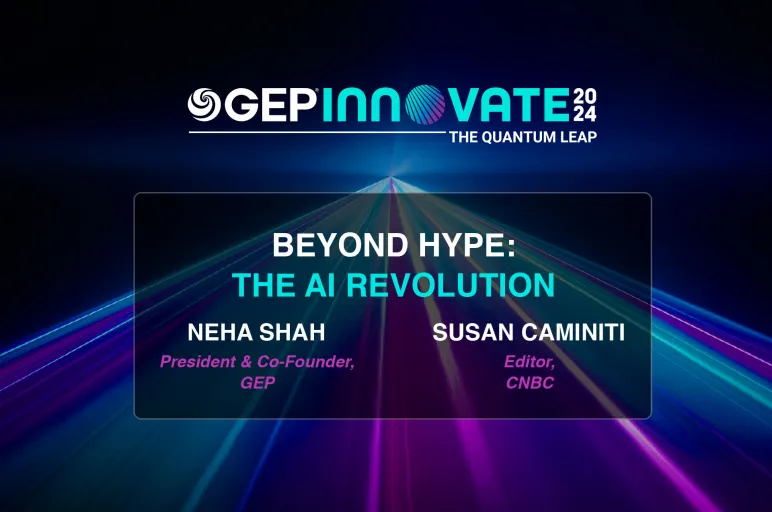
Why Gen AI Poised to Change the Procurement Process
- Speaking at GEP INNOVATE 2024, GEP President Neha Shah emphasized AI's role in enhancing software development and service delivery.
- She highlighted the importance of data quality and accessibility for effective AI.
- She also explained how AI can assist in complex challenges like diversifying manufacturing suppliers and mitigating supply chain risks.
November 16, 2024 | Procurement Software
In the rapidly evolving world of supply chain and procurement, generative AI is already a game-changer, and more change is ahead.
At GEP INNOVATE 2024, industry leaders gathered to discuss the transformative potential of AI and generative AI, shedding light on how these technologies are transforming how enterprises operate.
In a keynote session, GEP President and Co-founder Neha Shah said that, unlike previous technological advancements, AI is poised to impact every aspect of our professional and personal lives. “Whether it’s an end-to-end HR process, redoing your entire marketing brand strategy, your content strategy, thought leadership or your entire procurement and category management processes, generative AI will change everything," she said in a conversation with CNBC editor Susan Caminiti.
She acknowledged that change can be unsettling, but it is important to welcome innovation. “We need to change our fear to curiosity, embrace the potential of what it can bring.”
Revolutionizing Software and Services
Some of the key areas where AI is making a significant impact are in software development and service delivery. Shah highlighted how AI is changing the coding process, improving code quality and transforming service delivery processes.
This shift is about not just automating routine tasks but also enhancing higher-order decision-making and strategy formulation, she said. “From a GEP perspective, everything that we look at, every problem, we look at with an AI-first view.”
Practical AI Applications: Meeting Client Needs
GEP is taking this approach, Shah said, because clients are increasingly looking for high-value AI applications.
While AI is especially effective in routine tasks such as data entry, purchase orders and invoices, Shah stressed that AI’s potential goes beyond these capabilities. AI can assist in generating ideas and strategies for complex challenges like diversifying manufacturing suppliers and mitigating supply chain risks.
“We are in a world where AI can help us make decisions and learn so we can transform every single process we run,” Shah said.
Data Quality and Accessibility: The Cornerstone of AI
A recurring theme throughout the event was the importance of data quality and accessibility. AI’s effectiveness hinges on good data, which often resides in disparate systems.
Shah pointed out that assembling and cleaning data is crucial for running effective AI use cases. Companies need to ensure that their data is accurate, up-to-date and accessible to fully leverage AI’s capabilities, she noted.
“Once you have good data, the ability to run the right sort of prompts that will get you the information you’re looking for is really at your fingertips,” Shah said.
Data is at the heart of enhancing supply chain visibility, fueling real-time data and insights that help companies make informed decisions. By extracting and analyzing data from various sources, AI can offer clarity into tier 1, tier 2, and tier 3 suppliers, enabling better risk mitigation and supply chain management.
As companies experiment with generative AI, data security remains a critical concern. Shah advised using enterprise-grade AI solutions to ensure data privacy and security. She emphasized the importance of sanitizing and cleansing data before using it in AI models to prevent security breaches.
Impact on the Labor Force
While data and security are at the top of the mind, enterprises must also address concerns about AI replacing humans. While some fear AI will displace workers, Shah argued that AI would transform roles and require new skill sets instead.
Shah noted that the future workforce must interact with AI systems, make human-centric decisions, and excel in storytelling and communication.
With AI taking on more of the routine workload, procurement and supply chain professionals can focus on building relationships, Shah said. “Our ability to connect in procurement, to partner with our businesses to relate to what their problems are, what their needs are, what their different emotions are and things that are affecting their decisions, that’s what humans will continue to do.”
Conclusion
The session highlighted the transformative potential of generative AI in supply chain and procurement. AI is revolutionizing how businesses operate by enhancing software development and service delivery to improve supply chain visibility and data security. As companies navigate this new landscape, embracing AI and ensuring data quality and security will be key to unlocking its full potential.



